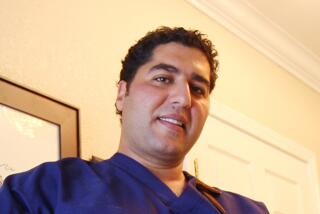Neurosurgeon’s Suit Over Hospital’s Peer Review Settled : Medicine: Plaintiff claimed St. Joseph staff doctors abused the process in ousting him and his colleagues.
ORANGE — An antitrust lawsuit alleging that a group of doctors at St. Joseph Hospital abused the facility’s care-review process to drive a neurosurgeon and his colleagues from the staff has been quietly settled out of court.
Dr. Mark E. Anderson, now chief of neurosurgery at Irvine Medical Center, entered into a confidential settlement with St. Joseph in April to end a 4-year-old lawsuit filed in Orange County Superior Court. Anderson had sought an unspecified amount in damages.
Hospital officials and attorneys for both sides declined to comment Wednesday, citing a gag order to keep the terms of the agreement secret. “I think the only word I can use when referring to the case is settled ,” Anderson said.
At issue was whether the hospital peer review process was used to purge the neurosurgery department of five physicians for reasons other than maintaining quality of care.
St. Joseph, like other medical centers, periodically subjects physicians to reviews of their work by others doctors in their specialty. The aim is to provide instruction and improve patient care.
Of the five physicians who lost their hospital privileges, Anderson was the only one to sue. The ensuing imbroglio at one of the county’s premier hospitals became known to neurosurgeons across the nation as “the Orange County Massacre.”
Named as defendants were St. Joseph; Dr. James Grimes, former chief of the medical staff; Dr. Brian Ewald, an orthopedic surgeon; Dr. James Hodge, a neuro-radiologist, and Dr. Donald Johnson, a neurologist who died during the litigation.
Anderson, 40, alleged that his economic competitors--St. Joseph’s orthopedic surgeons--and doctors with whom he has had professional differences misused the process to remove him and dismantle the neurosurgery division.
In that effort, he contended, the hospital fabricated evidence, filed groundless malpractice allegations against him and used physicians who were not neurosurgeons or had conflicts of interest with him to decide whether his staff privileges should be revoked.
The hospital’s attorney, Richard E. Madory, contended that St. Joseph had a legitimate concern about the quality of the neurosurgery department and initiated proper procedures to correct the situation.
Madory said that Anderson and his colleagues were judged by fair, objective people using the same kind of care-review process afforded every other physician on the staff.
The St. Joseph lawsuit was one of several antitrust cases around the country, alleging that doctors have improperly used peer review to remove physicians who compete with them for patients.
As a result of Anderson’s case, state and national neurosurgical associations have taken steps to assure that the work of neurosurgeons is judged by other neurosurgeons during peer review.
More to Read
Sign up for Essential California
The most important California stories and recommendations in your inbox every morning.
You may occasionally receive promotional content from the Los Angeles Times.











